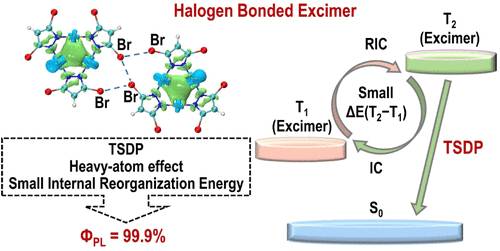
近单位量子产率的Cu(I)环三核配合物热激发延迟磷光的实现,这一成果由暨南大学化学与材料学院李丹
在此,该课题组研究人员提出了一种卤素键合的方法来实现溴取代的Cu(I)环三核配合物(ctc)的TSDP排放。光物理分析和理论计算揭示了卤素键在抑制激发态畸变和减小第一和第二三重态激发态(T1和T2)之间的能量差方面的关键作用。这实现了有效的自旋允许的反向内部转换,从而导致TSDP行为。此外,溴取代Cu(I) ctc具有较低的内部重组能和刚性的卤素键网络,从而显著抑制了非辐射衰变和高QYs,其中一个接近于近统一。这项工作提供了一种创新的方法,将TSDP行为从Au(I)/Au(III)扩展到具有高QYs的Cu(I)配合物。
据介绍,近年来,在一些Au(I)/Au(III)配合物中发现了热激发延迟磷光(TSDP)发射,具有热增强的发射强度和显著的量子产率(QYs)。开发地球上丰富的金属基TSDP发射器,进一步增加qy,具有重大的实际应用前景。
附:英文原文
Title: Enabling Thermally Stimulated Delayed Phosphorescence in Cu(I) Cyclic Trinuclear Complexes with Near-Unity Quantum Yield
Author: Guo-Quan Huang, Ri-Qin Xia, Xu Chen, Hu Yang, Yong-Liang Huang, Kun Wu, Ji Zheng, Weigang Lu, Dan Li
Issue&Volume: February 17, 2025
Abstract: Thermally stimulated delayed phosphorescence (TSDP) emission has recently been discovered in several Au(I)/Au(III) complexes, featuring thermally enhanced emission intensities and notable quantum yields (QYs). Developing earth-abundant metal-based TSDP emitters with further increased QYs holds significant promise for practical applications. Herein, we present a halogen bonding approach to achieve TSDP emission in bromo-substituted Cu(I) cyclic trinuclear complexes (CTCs). Photophysical analysis and theoretical calculations reveal the crucial role of halogen bonding in suppressing the excited-state distortions and reducing energy differences between the first and second triplet excited states (T1 and T2). This enables efficient spin-allowed reverse internal conversion, leading to the TSDP behavior. Additionally, the low internal reorganization energy and rigid halogen-bonded network in bromo-substituted Cu(I) CTCs result in significantly suppressed nonradiative decay and high QYs, with one approaching near-unity. This work provides an innovative approach to extend the TSDP behavior from Au(I)/Au(III) to Cu(I) complexes with high QYs.
DOI: 10.1021/jacs.4c09907
Source: https://pubs.acs.org/doi/abs/10.1021/jacs.4c09907
JACS:《美国化学会志》,创刊于1879年。隶属于美国化学会,最新IF:16.383
官方网址:https://pubs.acs.org/journal/jacsat
投稿链接:https://acsparagonplus.acs.org/psweb/loginForm?code=1000
